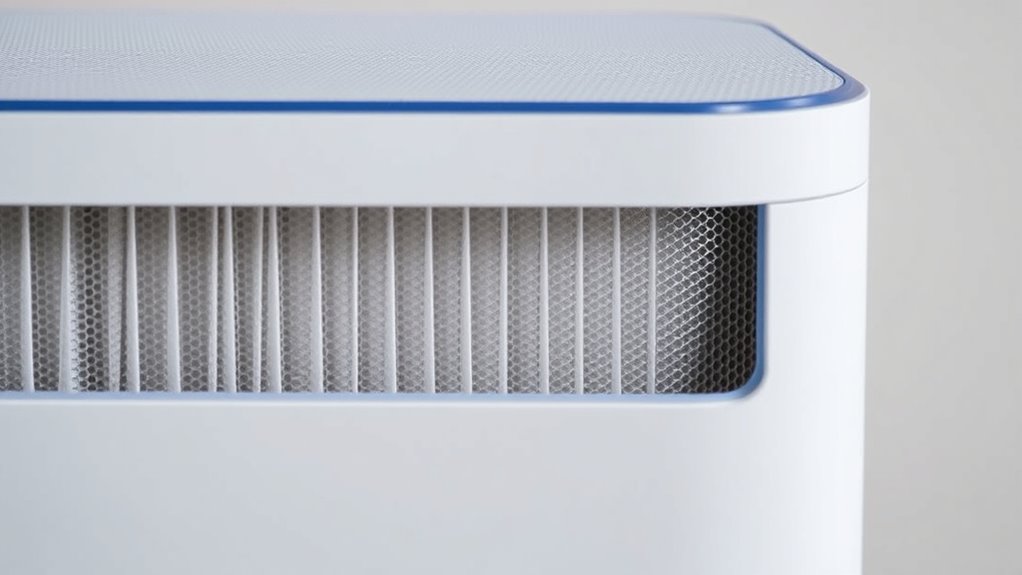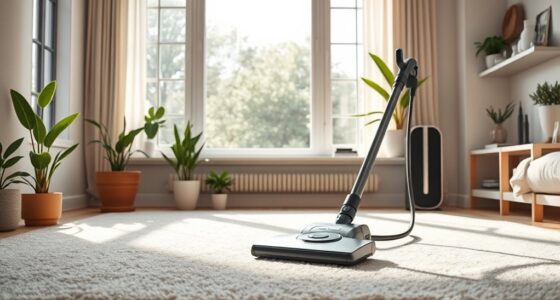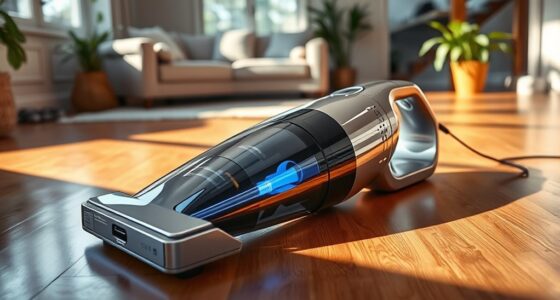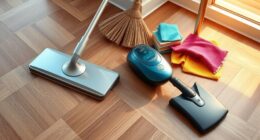When comparing HEPA‑sealed systems to “HEPA‑like” claims, it’s crucial to understand that true HEPA‑sealed systems guarantee that all air passes through the filter without leaks, thanks to airtight seals and durable framing. “HEPA‑like” units may meet some standards but often lack proper sealing, risking unfiltered air escaping and reducing effectiveness. To ensure reliable filtration, look for systems emphasizing tight seals and proven standards—continue exploring this to make an informed choice.
Key Takeaways
- True HEPA-sealed systems ensure airtight enclosure, preventing unfiltered air from bypassing the filter.
- “HEPA-like” claims may lack system sealing, risking unfiltered air leakage.
- Genuine HEPA-sealed units are tested with overall system integrity, not just the filter alone.
- Sealed systems feature sturdy frames and airtight seals to maintain filtration efficiency.
- Confirm specifications and design focus on preventing unfiltered air escape for authenticity.
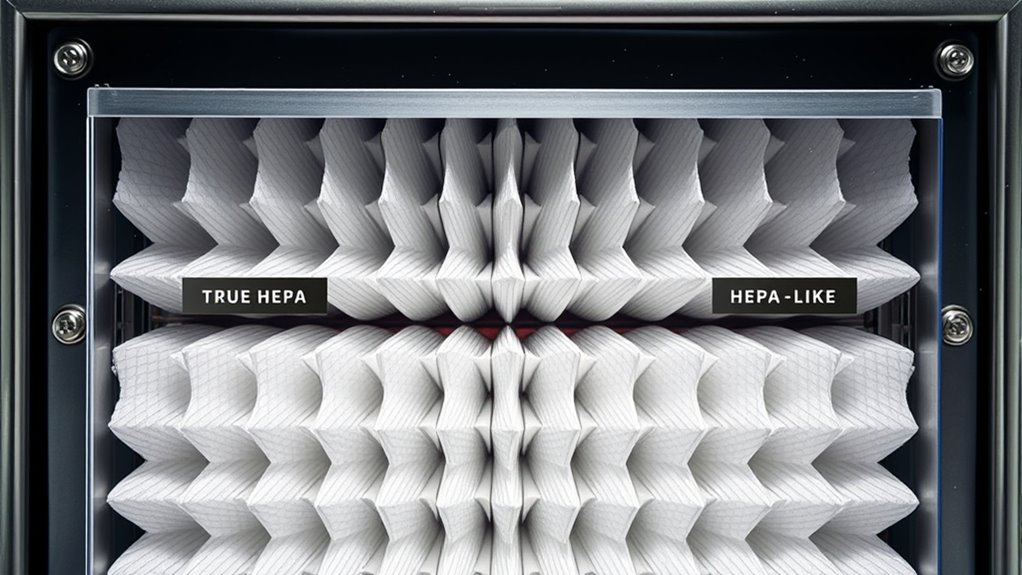
Have you ever wondered how certain air purification systems guarantee the highest level of cleanliness? It all comes down to the quality of air filtration and the system’s integrity. When you’re choosing a HEPA‑sealed system, understanding what sets genuine HEPA‑sealed units apart from “HEPA‑like” claims is essential. True HEPA‑sealed systems are designed with meticulous attention to system integrity, ensuring that air passes through the filter without bypassing or leaking around it. This guarantees that the air you breathe is consistently filtered to meet strict standards.
In a true HEPA‑sealed system, the filter is securely enclosed, and the entire unit is constructed to prevent unfiltered air from escaping or entering through gaps. This is critical because even the smallest leaks can markedly diminish the system’s effectiveness. When air filtration relies on a compromised system integrity, unfiltered air can bypass the HEPA filter, rendering the purification less effective. That’s why manufacturers emphasizing “HEPA‑like” often use less rigorous standards, which might include filters that only meet some HEPA specifications or are tested without considering system integrity. These units may claim high filtration efficiency but lack the necessary sealing to guarantee all air is properly filtered.
You should look for systems that clearly specify that the filter is HEPA‑sealed, meaning it’s housed in a way that guarantees no unfiltered air escapes. This involves using airtight seals, sturdy frames, and properly designed housings that keep the filter in place during operation. When system integrity is maintained, you can trust that the air passing through is being accurately filtered, capturing particles as small as 0.3 microns with 99.97% efficiency. This is the hallmark of a genuine HEPA‑sealed system.
Furthermore, a system with strong air filtration and integrity is easier to maintain and ensures consistent performance over time. You don’t need to worry about leaks or degraded filtering capacity because the design prioritizes airtight seals and durable components. Even after extended use, these systems will reliably deliver clean air, safeguarding your environment against airborne contaminants. Additionally, understanding the importance of system integrity helps in making informed choices about air purification.
Frequently Asked Questions
How Do Hepa‑Sealed Systems Compare to Other Air Filtration Technologies?
When comparing HEPA‑sealed systems to other air filtration tech, you’ll find they offer higher filtration efficiency, capturing 99.97% of particles down to 0.3 microns. Plus, they tend to operate with lower noise levels, making them ideal for sensitive environments. Unlike some filters that claim “HEPA-like” but don’t meet standards, sealed systems guarantee maximum performance, so you get cleaner, healthier air without sacrificing quiet operation.
Are Hepa‑Sealed Systems Suitable for All Indoor Environments?
Think of HEPA‑sealed systems like a tailored suit—they fit best where they’re needed. You might find them ideal for small to medium rooms, but larger spaces could require multiple units. Consider noise levels too, as some models can be loud. Overall, they’re suitable for many indoor environments, especially if air quality is a priority, but always match the system’s capacity to your room size and noise preferences.
What Maintenance Is Required to Keep a Hepa‑Sealed System Effective?
To keep your HEPA‑sealed system effective, you need to perform regular maintenance. This includes replacing filters as recommended by the manufacturer and checking the seal integrity to guarantee no air bypasses the filter. Regular inspections help maintain peak performance and air quality. Keep track of filter replacement schedules and promptly address any seal issues, so your system continues to filter airborne particles efficiently.
How Can I Verify if a System Truly Meets HEPA Standards?
To verify if a system truly meets HEPA standards, check its certification verification through reputable agencies like the U.S. EPA or ANSI. Look for a label indicating compliance with HEPA filter longevity and standards. Don’t rely solely on marketing claims; authentic systems will have verified certifications. You can also ask for test reports or independent lab results to confirm the system’s true HEPA performance, ensuring you’re getting an effective filtration solution.
Do Hepa‑Sealed Systems Impact Airflow or Energy Efficiency?
You might wonder if HEPA-sealed systems affect airflow impact or energy efficiency. These systems can slightly reduce airflow due to the sealed environment, which may require more energy to maintain proper circulation. However, they often improve overall air quality without substantially compromising efficiency. By choosing high-quality systems and proper maintenance, you can balance airflow and energy use, ensuring effective filtration without unnecessary energy costs.
Conclusion
Remember, not all “HEPA-like” claims are created equal—think of it as distinguishing a mirage from an oasis. When you choose a HEPA-sealed system, you’re securing a barrier as steadfast as the walls of Troy, ensuring cleaner air and peace of mind. Don’t settle for shadows; seek the real deal. By understanding the difference, you’re not just investing in equipment—you’re safeguarding your sanctuary, much like a vigilant guardian watching over their domain.
